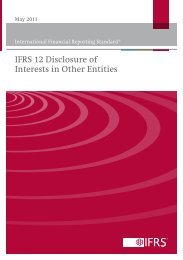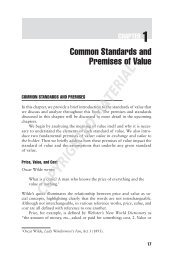ISSUE 5 2008 - Sweet & Maxwell
ISSUE 5 2008 - Sweet & Maxwell
ISSUE 5 2008 - Sweet & Maxwell
You also want an ePaper? Increase the reach of your titles
YUMPU automatically turns print PDFs into web optimized ePapers that Google loves.
396 Case & Comment [<strong>2008</strong>]<br />
false statements in the past about both sexual and non-sexual matters. The trial<br />
judge wrongly concluded that the questions were questions about the victim’s sexual<br />
behaviour within s.42(1)(c), and inadmissible under s.41(4). On appeal, Keene L.J.<br />
cautioned that where necessary courts would need to adopt a restrictive interpretation<br />
of s.41(4) if it would otherwise lead to the exclusion of relevant and significant evidence.<br />
The Court of Appeal emphasised that even if s.41(4) applied, it was necessary to<br />
decide whether the questions were about any sexual behaviour of the complainant. It<br />
was observed that:<br />
‘‘. ..[N]ormally questions or evidence about false statements in the past by a<br />
complainant about sexual assaults ...are not ones ‘about’ any sexual behaviour<br />
of the complainant. They relate not to her sexual behaviour but to her statements<br />
in the past ...the questions sought to be asked in both the present cases were<br />
not automatically excluded by s.41, even if they are seen as going principally to<br />
credibility.’’ ([2001] EWCA Crim 1877 at [33] and [34])<br />
Establishing the earlier allegations were false. Acknowledging the potential dangers,<br />
the court in T indicated that it was open to a judge to guard against abuse of the<br />
system, laying down a principle that has since been followed in this area. The defence<br />
need to seek a ruling from the judge that s.41 does not exclude the questions about<br />
false allegations. The defence must also have a proper evidential basis for asserting<br />
that any such previous statement was (a) made and (b) untrue. What constitutes a<br />
proper evidential basis is a difficult issue, and several judges have expressed real<br />
concerns about the danger of disputes on collateral matters. For example, in E (Dennis<br />
Andrew) [2004] EWCA Crim 1313; [2005] Crim L.R. 227, E was denied leave to<br />
cross-examine victims, aged six and four, about allegations they had made 15 months<br />
after the trial. Victim 1 had alleged abuse against a number of people, including her<br />
mother, an aunt and uncle, and another aunt and her son as well as physical abuse<br />
by an aunt and two others. Victim 2 alleged physical abuse on the part of some of<br />
the people mentioned by Victim 1 and by others. E’s argument was that it was wholly<br />
implausible that the children would have been abused by so many people and that the<br />
allegations were therefore almost certainly a fabrication or a fantasy. The Court of<br />
Appeal concluded that the evidential foundation had not been laid because none of the<br />
later allegations had been investigated. Compare Garaxo [2005] EWCA Crim 1170;<br />
[2005] Crim. L.R. 883 (refusal to assist police and reference by victim to getting a<br />
crime reference number for the ‘‘Social’’ capable of implying an improper motive for<br />
making the earlier allegation). Some commentators have argued that this decision<br />
is unduly permissive. In her comment on the case [2005] Crim. L.R. 883 at 884,<br />
Louise Ellison questioned the decision, doubting whether an inference of falsehood<br />
can safely be drawn from the mere fact of complainant withdrawal. It is probably the<br />
case that Garaxo marks the high point of admissibility. However, it can be argued that<br />
there was more in the case than a mere unwillingness to proceed. The requirement<br />
to provide an evidential foundation does not necessitate that all alternative inferences<br />
be eliminated, so that the only inference possible is that the allegation is false, merely<br />
that falsity is a reasonable inference to draw. In V [2006] EWCA Crim 1901, which<br />
involved the admissibility of three allegations of a sexual and non-sexual nature, the<br />
Court of Appeal regarded Garaxo as decided on its particular facts, and that ‘‘a failure<br />
to cooperate [with the police] may or may not justify a conclusion that an allegation is<br />
false, depending on the circumstances’’.<br />
© SWEET &MAXWELL






